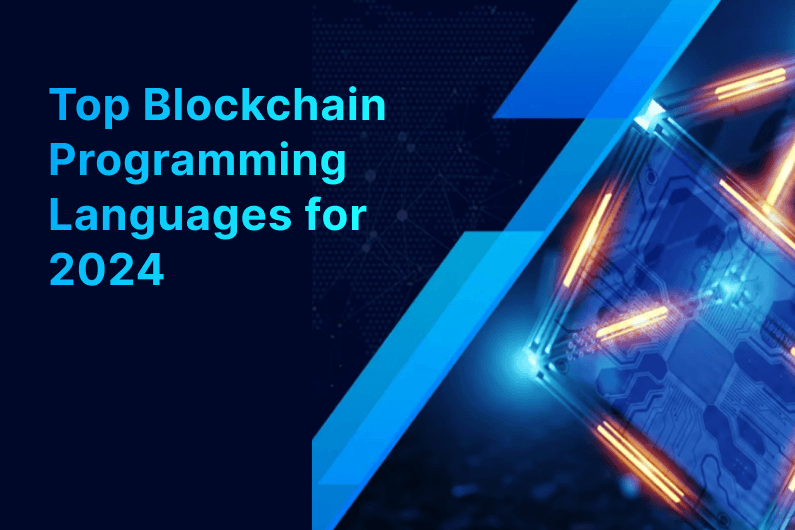Top Blockchain Programming Languages for 2024: A Comprehensive Guide
As the blockchain industry continues to evolve, the demand for skilled developers proficient in blockchain programming languages is skyrocketing. Whether you're a seasoned developer or a newcomer looking to break into the world of blockchain, understanding which programming languages are leading the charge in 2024 is crucial. In this blog post, we'll explore the top blockchain programming languages that are shaping the future of decentralized applications and smart contracts.


Md Kayesh
6 min readJuly 10, 2024
Solidity: The King of Smart Contracts
Why Learn Solidity?
Solidity remains the most popular programming language for developing smart contracts on the Ethereum blockchain and other EVM-compatible platforms. Its syntax is similar to JavaScript, making it accessible for many developers transitioning from web development to blockchain.
Key Advantages of Solidity:
- High-level language: Solidity's syntax abstracts many low-level concerns, speeding up development.
- Comprehensive tooling: Extensive libraries and tools are available, enhancing productivity and security.
- Large community: A robust community means better support, more tutorials, and more readily available answers to questions (4ire) (Chainlink).
Use Cases:
- Ethereum smart contracts
- EVM-compatible blockchains
JavaScript: Versatility Meets Blockchain
Why JavaScript is Essential?
JavaScript's versatility extends to the blockchain space, where it is used for both front-end and back-end development. Frameworks like Node.js facilitate interactions with blockchain networks, making it a vital skill for web3 developers.
Key Advantages of JavaScript:
- Ubiquitous: JavaScript is widely known and used, reducing the learning curve for new blockchain developers.
- Rich ecosystem: Extensive libraries and frameworks support blockchain development.
- Interoperability: Enables seamless interaction with existing smart contracts and blockchain networks (Codecademy) (Iglu).
Use Cases:
- Developing decentralized applications (dApps)
- Interacting with smart contracts
Python: Simplicity and Power Combined
Why Python is a Top Choice?
Python is well-known for its simplicity and readability, making it an ideal choice for blockchain development. With its numerous libraries and frameworks, Python enables efficient blockchain programming.
Key Advantages of Python:
- Easy to learn: Python's simple syntax is ideal for beginners.
- Versatile: Can be used for various blockchain applications, from scripting to smart contract development.
- Extensive libraries: Robust support for blockchain through libraries like Web3.py (Codecademy) (Iglu).
Use Cases:
- Blockchain integration
- Smart contract interactions
Go (Golang): Performance and Efficiency
Why Go is Gaining Traction?
Go, known for its performance and efficiency, is particularly suitable for backend development and running blockchain nodes. It's the language behind Ethereum's Geth client, underscoring its importance in the blockchain ecosystem.
Key Advantages of Go:
- Performance: Efficient memory usage and fast execution.
- Concurrency: Excellent support for concurrent programming, ideal for blockchain nodes.
- Robust: Statically-typed language with a strong standard library (Codecademy) (Iglu).
Use Cases:
- Blockchain nodes
- Backend services for blockchain applications
Rust: The Up-and-Coming Contender
Why Rust is Worth Considering?
Rust is becoming increasingly popular in the blockchain space due to its performance and safety features. It is the primary language for blockchains such as Solana and Polkadot, offering high performance and memory safety.
Key Advantages of Rust:
- Performance: Efficient and fast execution.
- Safety: Strong emphasis on memory safety and concurrency.
- Growing ecosystem: Increasing support and community around blockchain development (Iglu) (Chainlink).
Use Cases:
- Solana blockchain
- Polkadot blockchain
Vyper: Security and Simplicity
Why Vyper is a Solid Choice?
Vyper is designed for Ethereum smart contracts, with a syntax similar to Python. It's focused on security and simplicity, making auditing and understanding smart contracts easier.
Key Advantages of Vyper:
- Readable: Python-like syntax improves code readability.
- Secure: Strong typing and small compiler code enhance security.
- Focused: Simplifies contract development by removing complex features (Chainlink).
Use Cases:
- Ethereum smart contracts
- Secure blockchain applications
Conclusion
Choosing the right programming language for blockchain development in 2024 depends on your specific needs and background. Whether it's the widespread support and tooling of Solidity, the versatility of JavaScript, the simplicity of Python, the performance of Go, the safety of Rust, or the security focus of Vyper, each language offers unique strengths that can help you succeed in the blockchain space.
As blockchain technology continues to grow, staying updated with these top programming languages will ensure you remain at the forefront of innovation and development.
